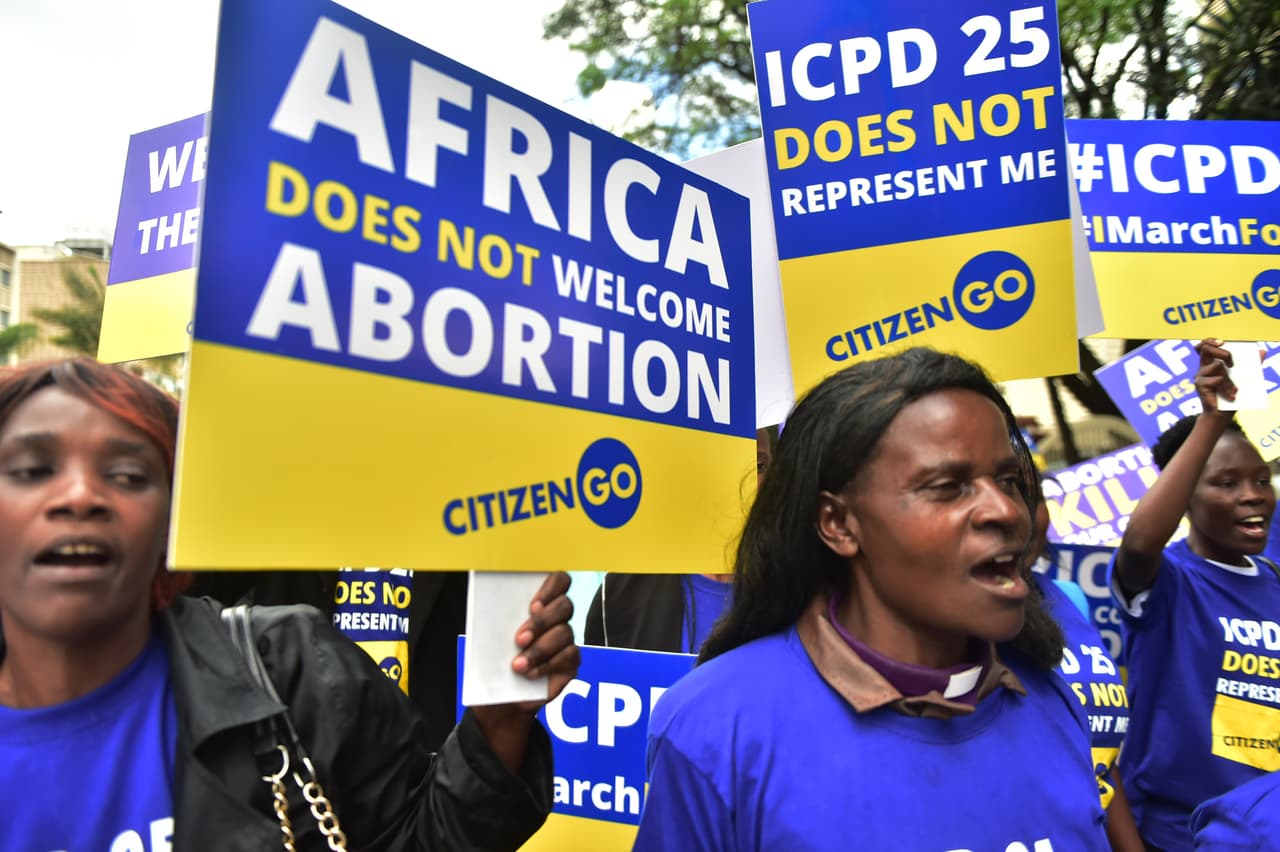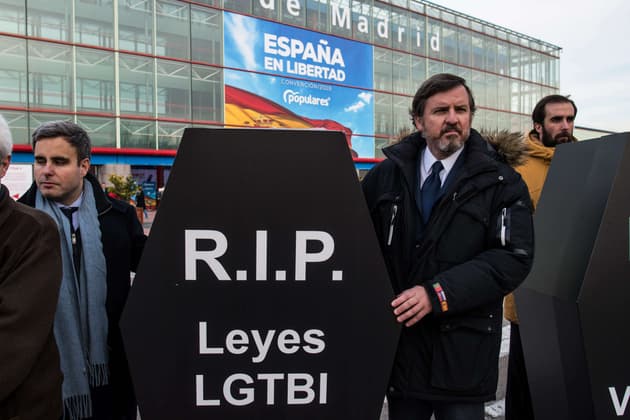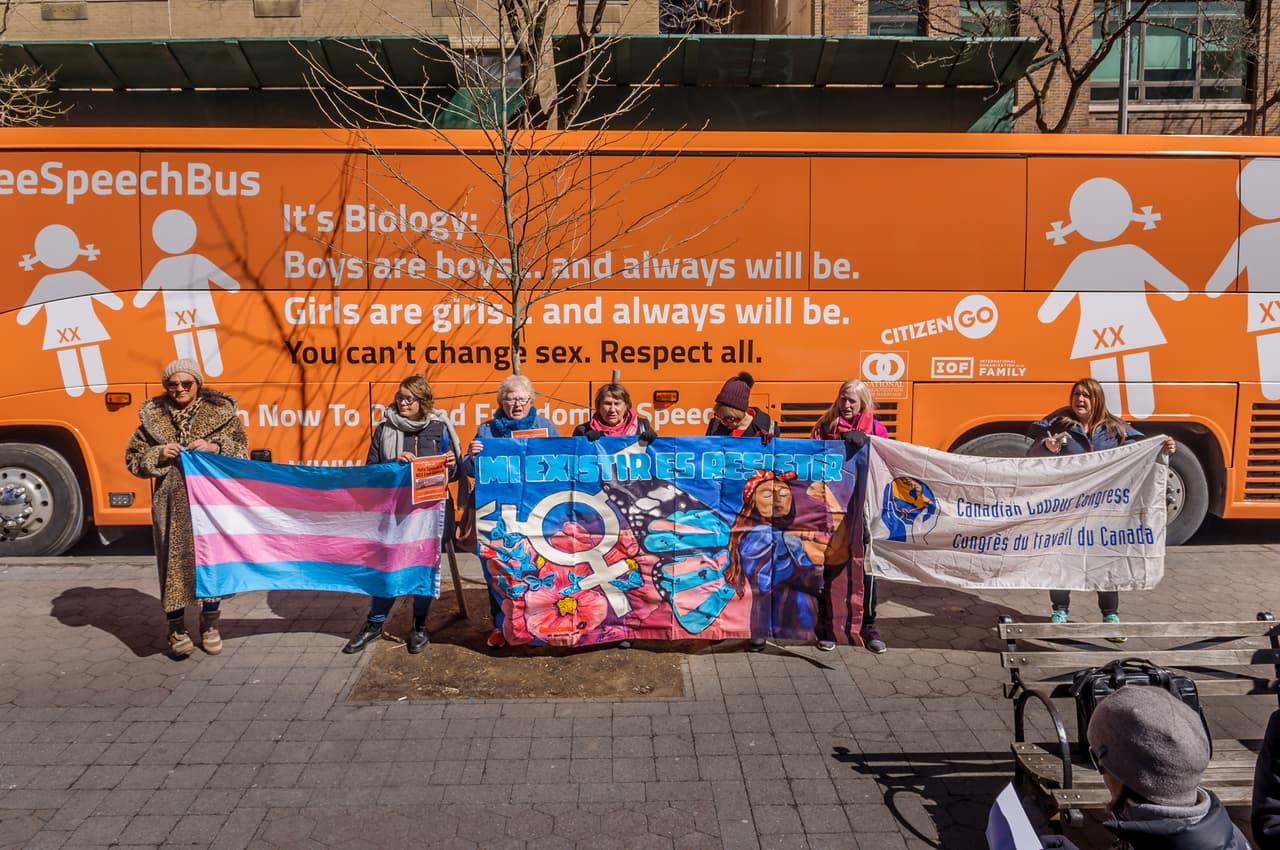
Unholy alliance: the far-right religious network attacking reproductive and LGBTQ+ rights
Things were tough enough for Nelly Munyasia, the executive director of Kenya’s Reproductive Health Network. Then came a surge of hateful propaganda targeting her and others working in reproductive health.
Munyasia says that as she saw her face appear on social media posts calling her a killer, she and her fellow targets were able to identify the strange driving force behind this sudden tide of hostility.
CitizenGO is an online community that claims to “promote life, family, and liberty”. It is also the main online outlet for an unlikely coalition of the US Christian right, militant European Catholics, Russian orthodox hardliners and even sanctioned oligarchs, all working in a concerted campaign to undermine reproductive and LGBTQ+ rights around the world.
“CitizenGO led on petitions, especially on the organisations that worked on sexual and reproductive health,” Munyasia said. “They led petitions to [target] activists that supported the abortion agenda, that supported LGBTQ rights and comprehensive sexual health education.”
Even as relations between Russia and the global West grow ever-more sour, this unlikely alliance of religious rightwingers – from Moscow to Madrid to Washington DC – is accused of mounting a campaign of massive misinformation and intimidation that amounts to “transnational opposition to reproductive rights across the globe”.
An investigation by the Bureau of Investigative Journalism and evidence collected by the data science company Signify shows how the network mixed digital campaigns, political lobbying and protests on the ground to fight against reproductive and LGBTQ+ rights in Kenya and Ghana. It claimed victory when legislation to extend access to abortion in Kenya was blocked, and played a key role in pushing a bill in Ghana that would impose lengthy prison sentences for LGBTQ+ people.
Munyasia said that she and her colleagues had been directly targeted by CitzenGO online. “We have seen CitizenGO troll us on social media … my photo being shown on social media as a killer, being called names, being called organisations that are funded by the whites, advancing the white agenda.” She added: “We have a hotline that we use for women and girls to call in when they need services, and they’ve called in to even threaten on these lines.”
From Russia with hate
Attempts by the US Christian right to export anti-reproductive health and abortion beliefs globally are well documented. But, unusually, CitizenGO incorporates an activist element of Russian Orthodox adherents with close ties to sanctioned oligarchs.
The group was founded in 2013 by Ignacio Arsuaga, a far-right Madrid lawyer. He had previously established HazteOir to promote a hardline Christian agenda in Spain, but CitizenGO was built for a global crusade.
 Ignacio Arsuaga, second right, founded CitizenGO in 2013
Marcos del Mazo/LightRocket via Getty Images
Ignacio Arsuaga, second right, founded CitizenGO in 2013
Marcos del Mazo/LightRocket via Getty Images
The organisation’s key link to Russian oligarchs is Alexey Komov, who has served as a board member and is a leading campaigner against abortion and LGBTQ+ rights in Russia. He has made no secret of his aims, or where his support comes from.
In a 2019 interview with the US-based conservative YouTuber Steve Turley, a well turned-out and self-assured Komov described his global ambitions: “Russia should become the prime defender of faith of conservatives of the world.” He went on: “It took me several years, and I really got support of large foundations, sponsored by large entrepreneurs like Mr Yakunin and Mr Malofeev … You wouldn’t believe, we have hundreds of American conservative leaders coming in the Kremlin like dear guests.”
“Mr Malofeev” is Konstantin Malofeev, a banker and media baron who was sanctioned by the EU, US and Canada in 2014 for funding separatists in Ukraine and was recently indicted by the US for conspiring with an American citizen to transfer a $10m investment that Malofeev made in a US bank to a business associate in Greece and hiring the American to work on his TV network. Komov is regularly described as Malofeev’s right-hand man or aide, and has worked for the oligarch’s charity, the St Basil the Great Foundation. “Mr Yakunin” is Vladimir Yakunin, another sanctioned oligarch heavily involved in hardline Christian foundations.
Komov was listed as one of CitizenGO’s board members until March this year, but was removed from the website shortly after Russia’s invasion of Ukraine. His bragging about wealthy supporters undermines CitizenGO’s claims that its $5m in annual income is made up entirely of donations from the public, as does evidence dating back to its founding that suggests financial ties via Komov to Russian oligarchs.
A hack of 17,000 documents relating to CitizenGo and HazteOir, published by Wikileaks and outlets in Europe and Mexico in 2021, shows how Arsuaga courted Christian fundamentalists on both sides of the great schism. In a letter from 2013 when he was setting up CitizenGO, Arsuaga asked Malofeev for €100,000 in seed funding to add to the €170,000 he had already raised. That same year he asked Brian Brown, a prominent American Catholic campaigner, if his ActRight conservative organising and fundraising platform would provide $50,000 per year to CitizenGO.
Targeting people all over the world?
Without a trace of irony, CitizenGO declares itself a network of citizens “stopping radical lobbies from imposing their agenda on society”. The policies it supports, however, are extreme – advocating increasingly strict restrictions on abortions, for example, and declaring that “tens of millions of children are slaughtered in the womb each year”.
“When you look at CitizenGO, we are talking about transnational opposition to reproductive rights across the globe,” said Martin Onyango, the associate director for legal strategies for Africa at the Center for Reproductive Rights.
“It is disinformation and misinformation and very outrageous misinformation based on no facts,” he added, pointing to false claims that abortion is murder and that Kenyan sexual health education was designed to encourage children to have sex. “That then drives emotions that trigger stigma, hate and dislike for reproductive health in the region.”
Kenya, along with Ghana, has proved a particular focus for the organisation. Of the 52 petitions analysed by the Bureau on the CitizenGo Website concerning African nations, 34 were aimed at Ghana and Kenya. There were 15 anti-abortion petitions, four of which specifically targeted abortion providers such as the international reproductive health charity Marie Stopes.
“They’re clear on what they want to do: get people to hate the subject, and basically then find a fertile ground to stretch the stigma and spread the dislike,” said Onyango, adding that “intimidation of public officials has been a key tactic CitizenGO has used – and intimidation comes in the form of doing public petitions”.
The petitions are often addressed to government ministers or officials. One in 2021, which claimed that Marie Stopes, had “spat in the face of all Kenyans”, attracted 150,000 signatures. It was not the first time Marie Stopes had come under fire from CitizenGO: in 2017 its campaign to force a government investigation led to an official order temporarily closing its clinics, which offered reproductive services including abortions.
More recently CitizenGO lobbied against a landmark reproductive healthcare bill that would have extended sexual health education. The group’s efforts helped to get the legislation shelved and delayed for at least two years.
Ann Kioko, CitizenGO’s lead in Africa, “leads a lot of opposition conversations in the country in terms of mobilising, mobilising the allies, organising for TV shows, organising for conferences, meetings”, said Munyasia of the Reproductive Health Network. “And these are not cheap, these are very expensive.”
A recent report from the Mozilla Foundation has also alleged that CitizenGO had secretly manipulated online conversations around reproductive healthcare in Kenya, including providing individuals with “money, content, and instructions” over WhatsApp about what to tweet.
The report found evidence of a coordinated campaign to attack activists and politicians on Twitter, and spread misinformation about abortion and other aspects of reproductive health. Interviews with a network of Twitter users who take money to make topics and opinions trend found that CitizenGO was paying for their services. Twitter subsequently removed 240 accounts after being presented with the report’s findings.
Family values
One of the narratives pushed by CitizenGO in Africa has been that reproductive and LGBTQ+ rights are Western values being imposed through colonialist structures. Yet as our investigation shows, CitizenGO is established and driven by foreign figures seeking to impose their own agenda.
CitizenGO has close ties to the World Congress of Families (WCF), an annual conference of religious leaders founded in the late 90s that was itself designed, after a trip to Moscow, to unite eastern and Western conservative Christians. Brian Brown, a CitizenGo board member, is a key figure and Komov has been its coordinator for Russia.
When approached, Brown told the Bureau that the characterisation of the activities of CitizenGO and World Congress of Families, as well as his involvement, were “made up garbage and lies”.
Requests for comment from Arsuaga, Komov, Malofeev and Yakunin received no response.

The support of Russian oligarchs has been welcome. In 2011, the WCF organised the Moscow Demographic Summit, which was supported by Malofeev and Yakunin. Both also spoke, along with Arsuaga, at the 2013 WCF held in Sydney, Australia. Yakunin and Malofeev’s foundations were also listed as official partners of the WCF as late as 2017.
Had it not been for Russia’s invasion of Crimea, the 2014 WCF would have been held in Moscow. A planning document features quotes on “the importance of the Natural Family and Demographic problems” from Vladimir Putin, former Russian president Dmitri Medvedev, Malofeev and Yakunin’s wife Natalia.
In Ghana, the WCF has played a particularly important role in laying the groundwork for a piece of virulently anti-LGBTQ+ legislation currently before parliament, primarily through an event it held in 2019. That year a WCF regional event was put on in Accra, Ghana’s capital. Among the key supporters of the event were CitizenGO; Ann Kioko – the group’s African lead – was a keynote speaker.
“They had come to town, they had meetings and they had this conference where they had all these influential people talking about how they need to deal with this thing and this threat in all the fanaticism that comes with it,” said Kojo Asante, the director for advocacy and policy engagement at the Ghana Center for Democratic Development. “It was immediately after that the bill was presented to parliament.”
The Promotion of Proper Human Sexual Rights and Ghanaian Family Values Bill would force Ghanians to report any LGBT person to authorities and legalise discrimination. It would outlaw gay sex and implement sentences of up to 10 years for producing content deemed to promote homosexuality.
At least one of the bill’s authors attended the WCF conference.
The bill is already being blamed for a rise in homophobic attacks, as reported by the Guardian. Asante told the Bureau: “At the moment I think the real concern is the daily attack on persons suspected to be members of the LGBT community. It’s almost every day that you hear of somebody beaten. Just recently there was a case where somebody was stabbed.”
Though it appears to have had less direct influence on the formation of the bill, CitizenGO has amplified support for it and attacked LGBTQ+ rights more generally. A petition on CitizenGO’s site by Advocates for Christ Ghana in March 2020 called for an LGBTQ+ conference in Ghana to be cancelled – which eventually it was, after direct government intervention.
The petition itself received more than 19,000 signatures and was reshared by more than 2,000 accounts. It reached a large audience in Ghana’s religious and political Facebook groups, being shared on pages with a combined audience of 1 million people.
One group supporting the Church of the Pentecost had 150,000 members. The church, which began as a British mission, was identified as one of the “most prominent supporters” of the bill by Signify.
Neither Kioko, nor Advocates for Christ Ghana responded to requests for comment.
Western values
CitizenGo may preach a cohesive set of hardline conservative Christian values, but its leading figures have varying motivations, according to Kristina Stoeckl, professor of sociology at the University of Innisbrook and the author of a forthcoming book on the Russian religious right.
Stoeckl says that for Arsuaga, the Catholic lawyer, CitizenGO was in part a response to the resignation of Pope Benedict XVI. Whereas for Brown, she says, WCF and CitizenGO were a continuation of longstanding opposition to LGBTQ+ and reproductive rights by elements of the US Christian right domestically and around the world. “The American story is the least surprising because they've been doing it since the 70s,” she said.
The involvement of figures from Russia is more unusual, and perhaps more individualised. “Komov is actually very open about his motivations he’s looking for, basically for a career as a lobbyist for something,” Stoeckl said. “And then he moves into that whole universe of Malofeev’s financing with and he carves out his space in there being the pro-family lobbyist.”
Malofeev, she believes, wants to create a globalised network for himself, in part to further his political ambitions and prepare for a post-Putin landscape.
The US supreme court decision overturning Roe v Wade would only spur them on to apply more pressure on institutions and governments around the world, she added. “I think it will embolden them. Because in a way, it shows that the strategy they've pursued has been successful.”
Header image: Anti-abortion activists protest in Nairobi, Kenya in 2019. Credit: Simon Maina/AFP via Getty Images
Reporting team: Jasper Jackson, Misbah Khan, Niamh McIntyre, Antoaneta Roussi and Selase Kove-Seyram
Global Editor: James Ball
Editor: Meirion Jones
Production: Frankie Goodway, Emily Goddard and Alex Hess
Fact checker: Matthew Chapman
Our reporting on Big Tech is funded by Open Society Foundations. None of our funders have any influence over the Bureau's editorial decisions or output.
-
Area:
-
Subject:





